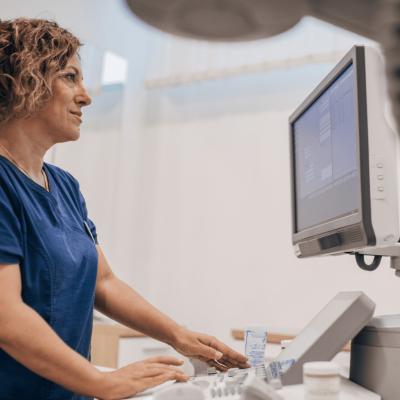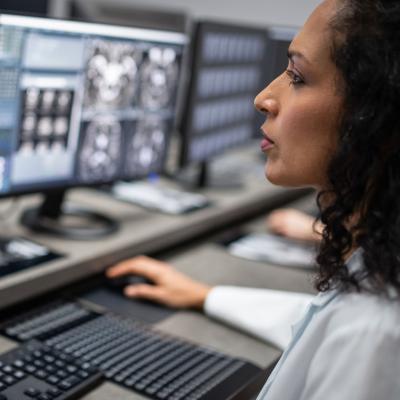- AdventHealth University

Imagine if you could see inside your body without having to go through surgery.
Nuclear medicine makes this possible by using small and safe amounts of radioactive materials to assist in viewing the function of various organs and tissues. This process works by using radioactive tracers (usually an isotope attached to a specialized compound) tailored for a specific organ, organ system, or tissue type.
This radioactive tracer (or radiopharmaceutical) is typically either injected into the body or swallowed in a pill. It then travels through the body and allows specialized imaging devices, such as gamma cameras or PET scanners, to detect the emitted gamma rays or positrons and create detailed images that provide information about the functioning and structure of organs and tissues.
This unique approach allows for the assessment of organ function, identification of diseases, and careful monitoring of treatment progress.
Uses of Nuclear Medicine
Nuclear medicine allows doctors to see things that may not be visible with other imaging techniques.
For example, it can be used to:
- Diagnose heart problems by assessing cardiac blood flow, identifying areas of reduced blood supply, and evaluating heart function.
- Diagnose and detect various types of cancer, including breast, lung, prostate, and bone cancer.
- Diagnose liver abnormalities and diseases.
- Diagnose and monitor brain conditions, such as epilepsy, Alzheimer's disease, and Parkinson's disease.
- Employ "theranostics" to both diagnose and treat disease.
Therapeutic procedures are also growing in nuclear medicine. An isotope can emit radiation to kill cancerous or diseased cells to a localized area with minimal risks to the surrounding tissue.
Careers in Nuclear Medicine
Nuclear medicine offers a wide range of career opportunities. You may choose to specialize in a particular area, such as diagnostic imaging, therapeutic radiology, or radiation safety. A Nuclear Medicine Technologist will typically work at hospitals, outpatient imaging centers, mobile imaging clinics, or as application specialists.
As a Nuclear Medicine Technologist, you'll perform diagnostic tests, administer radiopharmaceuticals, and monitor patients during and after a procedure. You'll also review test results and communicate them to the physician.
AdventHealth University’s Bachelor of Science in Nuclear Medicine Technology program teaches all of these skills and also offers Computerized Tomography education and clinical training. This Bachelor’s program at AHU is one of less than 15 programs in the country in which a student is qualified to take both nuclear medicine and CT board exams upon graduation and the only such degree program offered in the Central Florida area.
Once certified in both areas, graduates are eligible for multiple employment opportunities. Many graduates of the program have also gone on to work in radiation safety, management, pharmaceutical, or medical device industries.
Duties of A Nuclear Medicine Technologist
The main responsibilities of a Nuclear Medicine Technologist may include:
Patient Preparation
This includes explaining the procedure, addressing any concerns or questions, and ensuring that patients are adequately prepared - which may involve fasting or discontinuing certain medications before the procedure.
Radiopharmaceutical Administration
This includes calculating, measuring, and administering appropriate tracer dosages to patients safely and precisely.
Imaging and Scanning
Nuclear Medicine Technologists operate specialized imaging equipment to capture images of organs and tissues. They position patients correctly, calibrate equipment, and acquire high-quality images that accurately represent the distribution of the radiopharmaceuticals within the body. Technologists also monitor patients during scans, ensuring their comfort and cooperation throughout the procedure.
Image Analysis and Reporting
After acquiring the images, Nuclear Medicine Technologists play a crucial role in reviewing and analyzing them. They assess image quality, identify any abnormalities or areas of interest, and prepare detailed reports for radiologists or nuclear medicine physicians.
Radiation Safety and Quality Control
Nuclear Medicine Technologists are responsible for maintaining strict radiation safety protocols to protect patients, themselves, and other health care professionals. They ensure that all equipment is functioning properly, perform quality control tests, and adhere to regulatory guidelines. Technologists also educate patients and staff about radiation safety measures and monitor radiation exposure levels to maintain a safe working environment.
In addition to these primary duties, Nuclear Medicine Technologists may also be involved in research, quality improvement initiatives, and patient education, providing information on procedures, addressing concerns, and offering post-procedure care instructions.
The Importance of Nuclear Medicine
Overall, nuclear medicine is an indispensable diagnostic and therapeutic tool that plays a vital role in guiding modern health care decisions and improving patient outcomes. As a Technologist, you'll play a critical role in ensuring the safe and effective use of this powerful tool in diagnosing and treating various health conditions.
To learn more about a career in nuclear medicine, explore AdventHealth University’s Bachelor of Science in Nuclear Medicine Technology.
Recommended Readings
Benefits of Interventional Radiology
Nine Key Figures in Radiology
How to Become A Radiology Director
Sources
Society of Nuclear Medicine and Molecular Imaging, "What is Nuclear Medicine?"
American Cancer Society, "Nuclear Medicine"
Mayo Clinic, Mayo Foundation for Medical Education and Research, "Nuclear Medicine"


